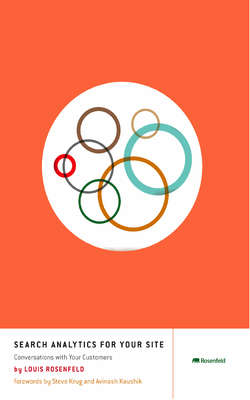Читать книгу Search Analytics for Your Site - Louis Rosenfeld - Страница 20
На сайте Литреса книга снята с продажи.
Measuring the Unmeasurable
ОглавлениеOf course, John wasn’t going to give up. Otherwise, this story would be a very boring way to kick off a book! Besides, a large IT investment—and people’s jobs—were at stake.
When John first started working on the project, his goal was to introduce user-centered thinking to the search engine selection process to complement the technical tests that IT would be using. To do so in an environment that was both technical and, as a corporation, driven by the bottom line, he had to wade into some treacherous waters—he’d have to come up with some metrics to quantify the experience of using the current search engine.
Now you might wonder what the big deal was. Either the search engine found the damned thing, or it didn’t—should be pretty easy to measure, right? Well, not quite.... There certainly are searches that work that way, for example, looking up a colleague’s phone number in the Vanguard staff directory. But many—probably most—searches don’t have a single “right” answer. “Parking,” “benefits,” and “experts” are all common queries on the Vanguard Intranet. They are also questions that have many answers—some more right than the others, but none that are ideal or perfect. From the perspective of users, relevance is very often relative.
Most designers know that it’s difficult to measure search performance and, well, just about any aspect of the user experience. In fact, being asked to do so causes droplets of sweat to form on many a designer’s brow. It just doesn’t feel right. Experience is difficult to boil down to a few simple, measurable actions. Considering that most of those in the field don’t have advanced degrees in statistics—and probably experienced similarly sweaty moments during high school algebra—it’s not surprising.
Yet, here was John Ferrara, with a bachelor’s degree in communications, sallying forth to measure the user experience of Vanguard’s search system.
